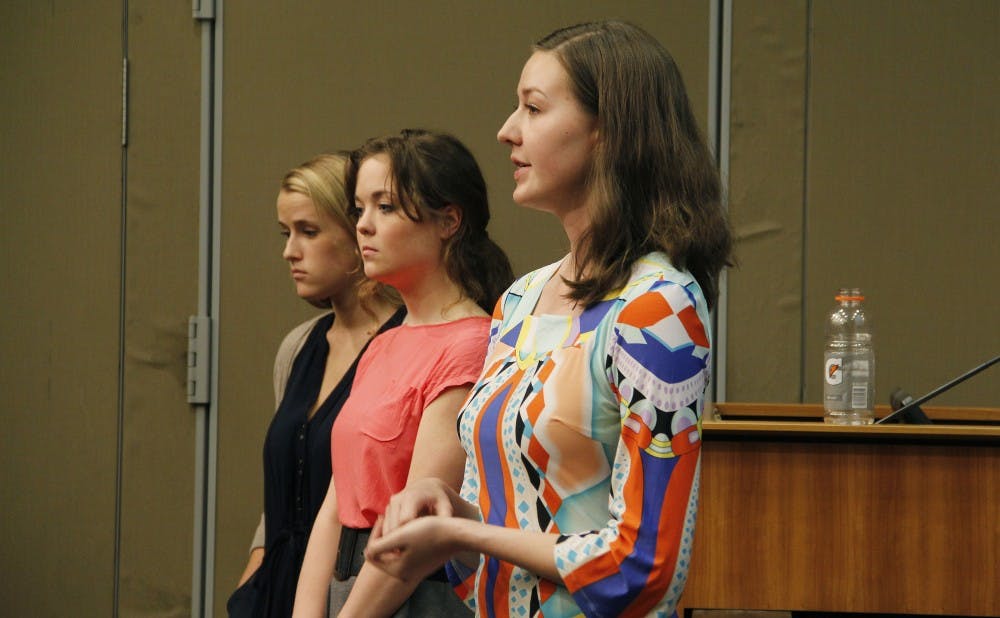Duke Student Government heard the first reading of the annual budget for the 2015-16 academic year during a meeting Wednesday.
The budget will provide the main source of income for many student groups over the next school year. It is funded by a portion of the activities fee collected from each student as part of tuition and fees. The budget is written by the Student Organization Funding Committee after it receives requests from student groups for certain amounts of money and has hearings for each group.
“We met over the span of two weeks for about thirty hours total discussing all of these budgets and having groups come in for hearings,” SOFC chair Davis Treybig, a junior, said. “After that initial round of hearings, I went through this past weekend and saw that we were around $40,000 over the budget and then we spent more time getting it down to the final $470,000 figure.”
Groups have to submit very detailed proposals outlining their expected costs over the upcoming year. Expenses which are typically funded by SOFC include groups’ capital expenditures, a select few private group events and recurring annual expenses.
Examples of capital expenditures include the purchase of a new camera for a photography club. Recurring annual expenses are often transportation and competition costs.
However, not all of these things can be funded due to the limited amount of money SOFC has to spread around roughly 100 student groups.
“The hardest part is that it’s hard to cut groups when [their requests] are really valuable things,” Treybig said. “Ideally we could fund everything, and there’s a lot items we wish we could fund but we just can’t due to a lack of money.”
The extreme variation between groups’ requests also makes it hard for SOFC to make decisions which it feels are in the best interests of every group.
“It’s hard to feel like we’re being truly consistent because so much of it is subjective,” Treybig said. “We try as much as we can to make it a fair allocation, but it’s impossible to be totally fair.”
This year’s budget will be higher than usual, at around $470,000. This is due to the de-chartering process which occurred in the Fall and put money allocated to inactive student groups back into the programming fund. The money collected through the process, about $120,000, will be spread out over the programming funds for the next three years. The 2015-16 and 2016-17 school years will receive an additional $30,000 towards their budgets and 2017-2018 will receive an extra $60,000.
The budget will be debated and voted on next week.
In other business:
The Student Organization Funding Committee approved $2,784 for Mi Gente’s Mezcla showcase during the Latino Student Recruitment Weekend.
SOFC also recognized three new groups—the Duke Film club, which will provide a forum for the viewing and discussion of films; YOUnite, a lobbying group for young people in North Carolina and beyond; and WHO Speaks, a group intended to create a community to discuss the complexity of women’s body image.
The DSG Research Unit presented its first data findings. In the first presentation, three DSGRU members spoke about patterns in SOFC funding. They found that in general, technical and rental fees were the most likely items to be covered by SOFC while food and transportation were less likely to be funded. In addition, cultural groups receive 80 percent of their funding requests while greek organizations only receive around half of their requests.
DSGRU director Kshipra Hemal, a junior, also spoke about a DSG demographic survey undertaken earlier in the year. Findings included that that the ratio of Trinity to Pratt students in DSG is higher than in the Duke student body, that males are overrepresented in DSG and that around a quarter of DSG members are public policy majors.
The DSG Senate passed several budgetary statutes allocating money from the programming fund—$550 for a Defining Racism panel and dinner which will address issues of race and ethnicity around campus, introduced by senators for equity and outreach Alice Reed and Riyanka Ganguly, both freshmen; and $1,470 for a poster project to raise awareness of gender violence on campus, also introduced by Reed.
The Senate also passed a budgetary statute allocating $7,200 from the legislative discretionary fund for a food truck fair April 10 to try out new dining options for the 2015-16 academic year.
Several by-law modifications were also introduced for a first reading by senator for equity and outreach and executive vice president-elect John Guarco, a sophomore. They will be debated and voted on next week.
Guarco, in conjunction with associate justice Nikolai Doytchinov, a senior, introduced a change to the judiciary by-law which would allow former justices go through a reappointment process rather than re-applying. This would make it easier for current justices to maintain their position in the next school year.
Guarco also introduced changes to the Senate by-law, which would make slight changes to the senator attendance rules and clarify the role of the executive vice president and president pro-tempore in appropriate situations. Additionally, the changes would slightly modify the nature of the statement of Legislative Intent written by each incoming senator at the beginning of their term.
Get The Chronicle straight to your inbox
Signup for our weekly newsletter. Cancel at any time.

